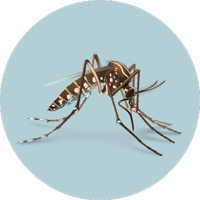What do you know about ZiKa?
- Zika is spread mostly by the bite of an infected Aedes species mosquito (Ae. aegypti and Ae. albopictus). These mosquitoes bite during the day and night.
- Zika can be passed from a pregnant woman to her fetus. Infection during pregnancy can cause certain birth defects.
- There is no vaccine or medicine for Zika.
- Local mosquito-borne Zika virus transmission has been reported in the continental United States. Learn more.

Let's watch the Video to learn more.
Diagnosis
- To diagnose Zika, a doctor or other healthcare provider will ask about any recent travel and any signs and symptoms. A blood or urine test can confirm a Zika infection.
- See a doctor or other healthcare provider if you develop symptoms of Zika (fever, rash, headache, joint pain, red eyes, or muscle pain) and live in or recently traveled to an area with risk of Zika or if you had sex without a condom with a person who lives in or traveled to an area with risk of Zika.
- If you are pregnant and live in or recently traveled to an area with risk of Zika or if you had sex without a condom with a person who lives in or traveled to an area with risk of Zika, you should see a doctor or other healthcare provider to discuss recommendations for Zika testing, even if you do not have symptoms.
- The doctor or other healthcare provider may order blood or urine tests to look for Zika or other viruses like dengue or chikungunya.
- It is important that you make sure to receive your Zika test results even if you are feeling better.
Sexual Transmission and Testing
- CDC recommends Zika virus testing for people who may have been exposed to Zika through sex if they also have Zika symptoms. Possible exposure to Zika virus from sex includes sex (oral, vaginal, or anal sex or the sharing of sex toys) without a condom with a partner who traveled to or lives in an area with risk of Zika.
- A blood or urine test can confirm Zika infection from sexual transmission; however, testing blood, semen, vaginal fluids, or urine is not recommended to determine how likely a person is to pass Zika virus through sex.
Resource

No comments:
Post a Comment